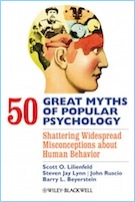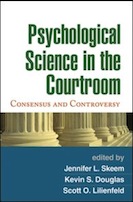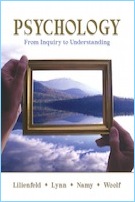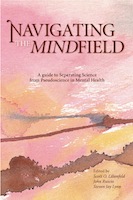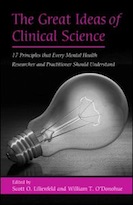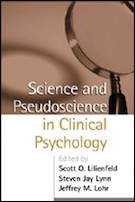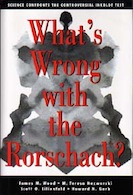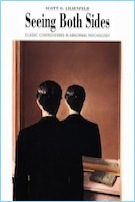
Scott O. Lilienfeld, PhD
Founding Fellow
Board of Directors
Atlanta, Georgia, USA
Scott O. Lilienfeld, PhD, FAPS, is the leading voice for science in mental health practices.
Dr Lilienfeld is professor of Psychology at Emory University in Atlanta and founder/editor of Scientific Review of Mental Health Practice. He is a Past President of the Society for a Science of Clinical Psychology (2001-2002), which is Section III within Division 12 (Society of Clinical Psychology) of the American Psychological Association (APA). He also served as the Division 12 Program Chair for the 2001 APA Convention. He has been a member of numerous journal editorial boards, including the Scientific Review of Alternative Medicine, Journal of Abnormal Psychology, Psychological Assessment, Assessment, Perspectives on Psychological Science, Clinical Psychology Review, and he has served as an external reviewer for approximately 60 journals and multiple grant proposals. He has a column, with Hal Arkowitz, in Scientific American Mind and blogs for Psychology Today. He is also an advisor to Skeptical Inquirer and Skeptic magazines.
Dr Lilienfeld has published over 200 articles, book chapters, and books on personality disorders (particularly psychopathic personality), personality assessment, anxiety disorders, psychiatric classification and diagnosis, pseudoscience in psychology, and evidence-based practices in clinical psychology. His most recent book, co-authored with Steven Jay Lynn, John Ruscio, and the late Barry L. Beyerstein, is 50 Great Myths of Popular Psychology: Shattering Widespread Misconceptions about Human Behavior (Wiley-Blackwell, 2010).
Professor Lilienfeld’s work on psychological science and pseudoscience has been featured in The New York Times (twice in feature articles in the “Science Times”), Los Angeles Times, The Wall Street Journal, Newsweek, Boston Globe, Washington Post, USA Today, The New Yorker, US News & World Report, and Scientific American. In addition, he has appeared on ABC’s 20/20, CNN, CBS Evening News, National Public Radio, Canadian Public Radio, and numerous other radio programs. In 1998, Dr Lilienfeld received the David Shakow Award for Outstanding Early Career Contributions to Clinical Psychology from APA Division 12, and in 2007 he was elected as a Fellow of the Association for Psychological Science. He is also a Fellow of the Committee for Skeptical Inquiry and a regular columnist for Scientific American Mind magazine.
Selected Books:
50 Great Myths of Popular Psychology: Shattering Widespread Misconceptions About Human Behavior, with Steven Jay Lynn, John Ruscio & Barry L. Beyerstein (Wiley-Blackwell, 2010). Popular myths are used as a vehicle for helping students and laypersons alike to distinguish science from pseudoscience — i.e., distinguishing factual from fictional claims — in popular psychology. Explores topics that many readers will relate to, but often misunderstand, such as “opposites attract,” “people use only 10% of their brains,” and handwriting reveals your personality. It provides a “mythbusting kit” for evaluating folk psychology claims in everyday life, and teaches essential critical thinking skills through detailed discussions of each myth. The book includes over 200 additional psychological myths for readers to explore, followed by a postscript of remarkable psychological findings that sound like myths but that are true. (Translations available in Spanish, Romanian, German, Dutch, Polish, and Czech.)
Psychological Science in the Courtroom: Consensus and Controversy, ed., with Jennifer L. Skeem & Kevin S. Douglas (Guilford, 2009). This book reviews the state of the science on a broad range of psychological issues commonly encountered in the forensic context. Its goal is to help professionals and students differentiate between supported and unsupported psychological techniques — and steer clear of those that may be misleading or legally inadmissible. Leading contributors focus on controversial issues surrounding recovered memories, projective techniques, lie detection, child witnesses, offender rehabilitation, psychopathy, violence risk assessment, and more. Included is an essay by ISM Fellow EF Loftus.
Psychology: From Inquiry to Understanding, with Steven Jay Lynn, Nancy J. Woolf & Laura L. Namy (Prentice Hall, 2008). This textbook for students of psychology encourages them to question and test their assumptions. The authors focus on motivating students to use scientific thinking skills to better understand the complex world of psychology.
Navigating the Mindfield: A Guide to Separating Science from Pseudoscience in Mental Health, editor, with John Ruscio & Steven Jay Lynn (Prometheus, 2008). A dizzying array of popular psychology books, articles, and promotion campaigns tout alleged remedies for psychological problems. This book brings together articles by leading scientific researchers and clinicians to help answer critical questions which arise when seeking mental health care. Dr Lilienfeld authored or co-authored seven chapters, while ISM Fellows JD Herbert, SJ Lynn, EF Loftus, and JA Mercer authored or co-authored many others.
The Great Ideas of Clinical Science: 17 Principles that Every Mental Health Professional Should Understand, editor, with William T. O’Donohue (Routledge, 2006). This book explores the fundamental rift between researchers and practitioners. Central to this scientist-practitioner gap is an underlying disagreement over the nature of knowledge – namely that while some individuals point to research studies as the foundation of truth, while others argue that clinical experience offers a more adequate understanding of the causes, assessment, and treatment of mental illness. Dr Lilienfeld co-authored some of the chapters.
Science and Pseudoscience in Clinical Psychology, editor, with Steven Jay Lynn & Jeffrey M. Lohr (Guilford, 2002). This is the first major text designed to help professionals and students evaluate the merits of popular yet controversial practices in clinical psychology, differentiating those that can stand up to the rigors of science from those that cannot. Leading researchers review widely used therapies for alcoholism, infantile autism, ADHD, and posttraumatic stress disorder; herbal remedies for depression and anxiety; suggestive techniques for memory recovery; and self-help models. Other topics covered include issues surrounding psychological expert testimony, the uses of projective assessment techniques, and unanswered questions about dissociative identity disorder. Providing knowledge to guide truly accountable mental health practice, the volume also is intended to imparts critical skills for designing and evaluating psychological research programs. Dr Lilienfeld co-authored some of the chapters (see publications below). (Japanese translation available.)
What's Wrong with the Rorschach? Science Confronts the Controversial Inkblot Test, with James M. Wood, M. Teresa Nezworski & Howard N. Garb (Jossey-Bass, 2003). This book offers a provocative critique of one of the most widely applied and influential – and still intensely controversial – psychological tests in the world today. Surveying more than fifty years of clinical and scholarly research, the authors provide compelling scientific evidence that the Rorschach has relatively little value for diagnosing mental illness, assessing personality, predicting behavior, or uncovering sexual abuse or other trauma. In a novelistic account of the Rorschach's origins and history, the authors detail the wealth of scientific evidence that the test is of questionable utility for real-world decision making. The book presents a reasoned case against using the test in the courtroom or consulting room, and reveals the strong psychological, economic, and political forces that continue to support the Rorschach despite the research that has exposed its shortcomings and dangers.

Seeing Both Sides: Classic Controversies in Abnormal Psychology (Wadsworth Publishing, 1994). This book of readings by renowned specialists presents the pros and cons of 19 issues which have been persistently controversial in the field of abnormal psychology. Each presentation begins with an introduction by Dr Lilienfeld, followed by two readings that adopt conflicting – and in some cases diametrically opposed – perspectives on the issue being debated.
Selected Publications:
- “What are evidence-based treatments?” (with JD Herbert), in J Hallmayer and S Boelte, eds., Autism Spectrum Conditions: International Experts Answer Your Questions on Autism, Asperger Syndrome and PDD-NOS (Cambridge, MA: Hogrefe, in press).
- “Can psychology become a science?” Personality and Individual Differences, 2010 Sep; 49(4):281-288. [DOI]
- “The top ten myths of popular psychology” (with SJ Lynn, J Ruscio & BL Beyerstein), Skeptic, 2010; 15(3):36-43.
- “Is there a research-practice gap? Not if you listen to APA…” Psychotherapy Brown Bag, 2010 Feb.
- “Cognitive processes, trauma, and dissociation: misconceptions and misrepresentations (Reply to Bremner, 2009)” (with T Giesbrecht, SO Lilienfeld & H Merckelbach), Psychological Bulletin, 2010 Jan; 136(1):7-11.
- “Forensic hypnosis: the state of science” (with SJ Lynn, E Boycheva, A Deming & MN Hallquist), in JL Skeem, KS Douglas & SO Lilienfeld, eds., Psychological Science in the Courtroom: Consensus and Controversy (Guilford, 2009, q.v.):80-99.
- “The five great myths of popular psychology: implications for psychotherapy” (with SJ Lynn & BL Beyerstein), in D David, SJ Lynn & A Ellis, eds., Rational and Irrational Beliefs: Research, Theory, and Clinical Practice (Oxford University Press, 2009):313-338.
- “Cognitive processes in dissociation: An analysis of core theoretical assumptions” (with T Geisbrecht, SJ Lynn & H Merckelbach), Psychological Bulletin, 2008 Sep; 134(5):617-647. [abstract]
- “Posttraumatic stress disorder: An empirical evaluation of core assumptions” (with GM Rosen), Clinical Psychology Review, 2008 Jun; 28(5):837-868. [DOI]
- “Psychology: initial thoughts, reflections, and considerations” (with SJ Lynn & JM Lohr), in SO Lilienfeld, J Ruscio & SJ Lynn, eds., Navigating the Mindfield: A Guide to Separating Science from Pseudoscience in Mental Health (Prometheus, 2008, q.v.):57-74.
- “Psychotherapy on trial” (with H Arkowitz), in SO Lilienfeld, J Ruscio & SJ Lynn, eds., Navigating the Mindfield: A Guide to Separating Science from Pseudoscience in Mental Health (Prometheus, 2008, q.v.):103-110.
- “What’s wrong with this picture” (with JM Wood & HM Garb), in SO Lilienfeld, J Ruscio & SJ Lynn, eds., Navigating the Mindfield: A Guide to Separating Science from Pseudoscience in Mental Health (Prometheus, 2008, q.v.):133-144.
- “The Rorschach inkblot test, fortune tellers, and cold reading” (with JM Wood, MT Nezworski & HM Garb), in SO Lilienfeld, J Ruscio & SJ Lynn, eds., Navigating the Mindfield: A Guide to Separating Science from Pseudoscience in Mental Health (Prometheus, 2008, q.v.):145-158.
- “Memory recovery techniques in psychotherapy: problems and pitfalls” (with SJ Lynn, EF Loftus & TG Lock), in SO Lilienfeld, J Ruscio & SJ Lynn, eds., Navigating the Mindfield: A Guide to Separating Science from Pseudoscience in Mental Health (Prometheus, 2008, q.v.):283-304.
- “EMDR Treatment: less than meets the eye?” in SO Lilienfeld, J Ruscio & SJ Lynn, eds., Navigating the Mindfield: A Guide to Separating Science from Pseudoscience in Mental Health (Prometheus, 2008, q.v.):403-418.
- “Psychology: concluding thoughts and constructive remedies” (with SJ Lynn & JM Lohr), in SO Lilienfeld, J Ruscio & SJ Lynn, eds., Navigating the Mindfield: A Guide to Separating Science from Pseudoscience in Mental Health (Prometheus, 2008, q.v.):607-612.
- “Psychological treatments that cause harm,” Perspectives on Psychological Science, 2007 Mar; 2(1):53-70.
- “Science is an essential safeguard against human error” (with WT O’Donohue & KA Fowler), in SO Lilienfeld & WT O’Donohue, eds., The Great Ideas of Clinical Science: 17 Principles that Every Mental Health Professional Should Understand (Routledge, 2006, q.v.):3-28.
- “Some forms of psychopathology are partly socially constructed” (with SJ Lynn, A Matthews, JC Williams & MN Hallquist), in SO Lilienfeld & WT O’Donohue, eds., The Great Ideas of Clinical Science: 17 Principles that Every Mental Health Professional Should Understand (Routledge, 2006, q.v.):347-374.
- “Why scientists shouldn’t be surprised by the popularity of Intelligent Design,” Skeptical Inquirer, 2006 Jun; 30(3):.
- “The heuristic value of controversy in science,” Behavioral and Brain Sciences, 2006 Dec; 29(6):580-581. [DOI]
- “Scientifically unsupported and supported interventions for childhood psychopathology: a summary,” Pediatrics, 2005 Mar; 115(3):761-764. Although numerous scientifically supported treatments are available for childhood psychiatric disorders, many of the most popular interventions for these conditions are based on weak or nonexistent data. This article offers basic guidelines for distinguishing scientifically supported from unsupported treatments for 3 important childhood psychiatric disorders: autistic disorder, attention-deficit/hyperactivity disorder, and conduct disorder. A key challenge for the future will be to place the treatment of childhood psychiatric disorders on firmer scientific footing. [DOI]
- “Roots of the Rorschach controversy” (with HN Garb, JM Wood & T Nezworski), Clinical Psychology Review, 2005 Jan; 25(1):97-118.
- “Pseudoscience, nonscience, and nonsense in clinical psychology: dangers and remedies” (with KA Fowler, JM Lohr & SJ Lynn), in NA Cummings & RH Wright, eds., Destructive Trends in Mental Health: The Well Intentioned Path to Harm (Taylor & Francis, 2005):187-218.
- “ [Excellence in Teaching:] Teaching psychology students to distinguish science from pseudoscience: pitfalls and rewards,” PsychTeacher Electronic Discussion List, 2004 Jun.
- “Pseudoscience is alive and well” (with SJ Lynn & JM Lohr), Scientific Review of Mental Health Practice, 2003 Fall-Winter; 2(2):. [abstract]
- “Dissociative Identity Disorder: multiple personalities, multiple controversies” (with SJ Lynn), in SO Lilienfeld, SJ Lynn & JM Lohr, eds., Science and Pseudoscience in Clinical Psychology (Guilford, 2002, q.v.):109-142.
- “The remembrance of things past: problematic memory recovery techniques in psychotherapy” (with SJ Lynn, TG Lock, EF Loftus, & E Krackow), in SO Lilienfeld, SJ Lynn & JM Lohr, eds., Science and Pseudoscience in Clinical Psychology (Guilford, 2002, q.v.):205-239.
- “The Scientific Review of Mental Health Practice: our raison d’être,” Scientific Review of Mental Health Practice, 2002 Spring-Summer; 1(1):.
- “A funny thing happened on the way to my American Psychologist publication," American Psychologist, 2002 Mar; 57(3):225-7.
- “When worlds collide: social science, politics, and the Rind et al. (1998) child sexual abuse meta-analysis,” American Psychologist, 2002 Mar; 57(3):176-188. [abstract]
- “Multiple Personality Disorder” (with SJ Lynn), in MB Shermer, ed., The Skeptic Encyclopedia of Pseudoscience (ABC-Clio, 2002), 1:146-151.
- “EMDR: eye movement desensitization and reprocessing” (with GM Rosen & RJ McNally), in MB Shermer, ed., The Skeptic Encyclopedia of Pseudoscience (ABC-Clio, 2002), 1:321-326.
- “The teaching of courses in the science and pseudoscience of psychology” (with JM Lohr & D Morier), Teaching of Psychology, 2001; 28:182-191.
- “The scientific status of projective techniques” (with JM Wood & HN Garb), Psychological Science in the Public Interest, 2000 Nov; 1(2):27-66. [DOI]
- “Science and pseudoscience in the development of Eye Movement Desensitization and Reprocessing: implications for clinical psychology” (with JD Herbert, JM Lohr, RW Montgomery, WT O’Donohue, GM Rosen & DF Tolin), Clinical Psychology Review, 2000 Nov; 20(8):945-971. The enormous popularity recently achieved by Eye Movement Desensitization and Reprocessing (EMDR) as a treatment for anxiety disorders appears to have greatly outstripped the evidence for its efficacy from controlled research studies. The disparity raises disturbing questions concerning EMDR’s aggressive commercial promotion and its rapid acceptance among practitioners. … We argue that EMDR provides an excellent vehicle for illustrating the differences between scientific and pseudoscientific therapeutic techniques. Such distinctions are of critical importance for clinical psychologists who intend to base their practice on the best available research. [DOI]
- “Psychopathology,” in AE Kazdin, ed., Encyclopedia of Psychology (American Psychological Association, 2000).
- “The Rorschach test in clinical diagnosis: a critical review, with a backward look at Garfield (1947)” (with JM Wood, HN Garb & MT Nezworski), Journal of Clinical Psychology, 2000 Mar 22; 56(3):395-430.
- “Research review: new analyses raise doubts about replicability of ESP findings,” Skeptical Inquirer, 1999 Nov-Dec; 23(6):.
- “Eye movement magic” (with GM Rosen & RJ McNally), Skeptic, 1999; 7(4):66.
- “Dissociative Identity Disorder and the sociocognitive model: recalling the lessons of the past” (with SJ Lynn, I Kirsch, JF Chaves, TR Sarbin, GK Ganaway & RA Powell), Psychological Bulletin, 1999; 125(5):507-523.
- “The Rorschach inkblot test: a case of overstatement?” (with JM Wood), Assessment, 1999 Dec; 6(4):341-351. In the 1940s, inflated claims were often made regarding the Rorschach inkblot test. Over half a century later, overstatements regarding the test are still common. The present article identifies problems with the Rorschach regarding norms, cultural sensitivity, interrater reliability, test-retest reliability, validity, factor structure, and accessibility of supporting studies. Contrary to overstated claims made on behalf of the Rorschach, the test continues to be a highly problematic instrument from a psychometric standpoint. [DOI]
- “EMDR: less than meets the eye,” in SO Lilienfeld, ed., Looking Into Abnormal Psychology: Contemporary Readings (Wadsworth Publishing, 1998, q.v.):195-201.
- “Dolphin-assisted therapy: flawed data, flawed conclusions” (with L Marino), Anthrozoos, 1998; 11:194-200.
- “Repressed memories and World War II: some cautionary notes” (with EF Loftus), Professional Psychology: Research and Practice, 1998 Oct; 29(5):471-475.
- “Efficacy of eye movement desensitization and reprocessing: implications for behavior therapy” (with JM Lohr & DF Tolin), Behavior Therapy, 1998 Winter; 29(1):123-156. [DOI]
- “Development and preliminary validation of a self-report measure of psychopathic personality traits in noncriminal population” (with BP Andrews) Journal of Personality Assessment, 1996 Jun; 66(3):488-524. [DOI]
Psychology Today Blog (“The Skeptical Psychologist”):
- “Coma, dubious science, and false hope,” 2009 Nov 25.
- “The Rorschach-Wikipedia kerfuffle continues,” 2009 Aug 3.
- “The polygraph test strikes – and strikes out – again,” 2009 Jul 21.
- “Michael Jackson, truth serum, and false memories,” 2009 Jul 7.
- “Is Positive Psychology for everyone? New research raises doubts,” 2009 Jun 19.
- “The autism fad parade continues,” 2009 May 31.
Selected Presentations:
- “Pseudoscience in mental health practice: problems, pitfalls, and prescriptions,” Argosy University, 2010 Apr 8.
- “Blink or think? When to trust – and not to trust – our common sense intuitions,” Argosy University, 2010 Apr 10.
- “What every clinician should know about psychopathic personality,” Psyc.tv Online Continuing Education.
- “PsychTV: An interview about 50 Great Myths of Popular Psychology,” Psyc.tv Online Continuing Education.
- “Fringe psychotherapies – what lessons can we learn?” Symposium moderator (with JM Lohr, JD Herbert, MT Singer & GC Davison), American Psychological Association, annual convention, 2001 Jun.
In the News:
- “Academic battle delays publication by 3 years,” by Benedict Carey, The New York Times, 2010 Jun 11.
- “Get shrunk at your own risk,” by Sharon Begley, Newsweek, 2007 Jun 18. “The profession hasn’t shown much interest in the problem of treatments that can be harmful,” says psychology professor Scott Lilienfeld of Emory University. “Of the few psychotherapies that have been tested for safety, too many cause harm to at least some patients.”
- “Against types: personality tests are everywhere – from the workplace to the courtroom,” by Drake Bennett, Boston Globe, 2004 Sep 12.
- “Defying psychiatric wisdom, these skeptics say ‘prove it’,” by Erica Goode, The New York Times, 2004 Mar 9.
- “What’s in an inkblot? Some say, not much,” by Erica Goode, The New York Times, 2001 Feb 20.
The Online Scott Lilienfeld:









